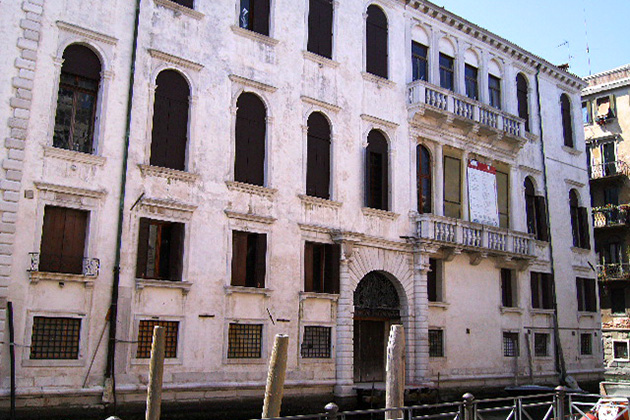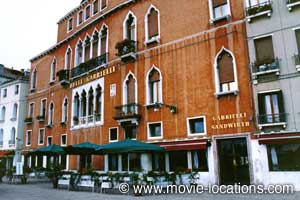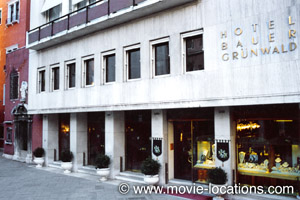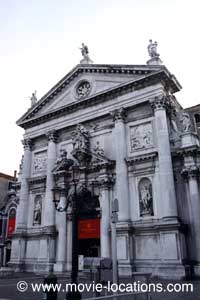Don't Look Now| 1973


- Locations |
- Italy; Hertfordshire
- DIRECTOR |
- Nicolas Roeg
Dank, crumbling, off-season Venice provides the setting for Nicolas Roeg’s reinvention of a Daphne du Maurier short story as a dazzling – and disturbing – cinematic mosaic.
Sceptical architect John Baxter (Donald Sutherland), doomed by a refusal to accept his own extrasensory powers, and his wife Laura (Julie Christie) live at Baas Manor, Baas Hill near Broxbourne in Hertfordshire. It's here that the accidental death of their young daughter disrupts their comfortable life. This is a private home, so please do not disturb the residents.
They attempt to get over the tragedy with a holiday in Venice, where John Baxter is overseeing the renovation of one of the city's old churches.
The couple stays at the ‘Europa Hotel’ – but you won't be able to follow them exactly. The fictitious ‘Europa’ is a conflation of two classy – and pricy – Venetian establishments.

The lobby and the exteriors are those of the four-star Hotel Gabrielli, Castello 4110, Riva degli Schiavoni, a converted Gothic palace overlooking the San Marco Canal just east of the Piazza San Marco.

The hotel interior – location for one of cinema’s most convincing sex scenes – is over to the west of Piazza San Marco, the expensive Bauers Venetia, San Marco 1459, Campo San Moise.

The church Baxter is restoring is way down in the southwest of the city. It’s San Nicolo dei Mendicoli, one of the oldest in Venice and restored – in real life – during the Seventies (though you won’t see the mosaic worked on in the movie, which was nothing more than a film prop).
The church, which is open to the public from 10 till noon in the mornings and 4.30 to 7.30 in the afternoon, is on Campo San Nicolo, a small square surrounded on three sides by the Rio di San Nicolo and the Rio delle Terese. To get to it, you need to follow the Canale della Giudecca waterfront, the Fondamenta delle Zattere, west past the Stazione Marittima toward the rather glum, industrial San Marta area.
The suspicious detective follows Baxter through the San Polo district in the centre of the northern curve of the Grand Canal’s reverse ‘S’, to the southwest of Venice’s second largest square, the Campo San Polo: the Calle di Castel Forte and the Ponte Vinanti.
The restaurant in which John and Laura meet the two strange sisters is the Ristorante Roma, Cannaregio 122, near to the Ponte Scalzi over the Grand Canal by the railway station, Stazione Ferrovia Santa Lucia.

After Laura collapses, she’s taken to hospital from the landing stage on the north side of the Grand Canal here. The sisters stay at La Fenice et des Artistes, San Marco 1936, Campiello Fenice alongside, and serving, the Fenice Opera House which burned to the ground in such mysterious circumstances, west of Piazza San Marco.

The narrow canal, to which Baxter finally follows the tiny red-coated figure, is the Calle di Mezzo, northeast of Piazza San Marco, to the gates of the Palazzo Grimani a Santa Maria Formosa (at the junction of Rio di Santa Maria Formosa and Rio di San Severo – don’t confuse it with the other Palazzo Grimani on the Canal Grande), where he finds out that – oops! – it’s not his daughter after all.

The Palazzo has been deserted for years, but in 1998 was in the process of being renovated. It's now a museum. The gated entrance to the Palazzo, through which Baxter enters, can be seen on Calle di Mezzo.

The funeral, which ends the film, is at the 17th century Church of San Stae (a contraction of San Eustachio) at Campo San Stae on the northern curve of Canal Grande.





